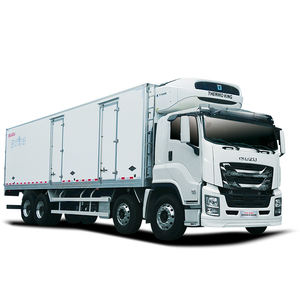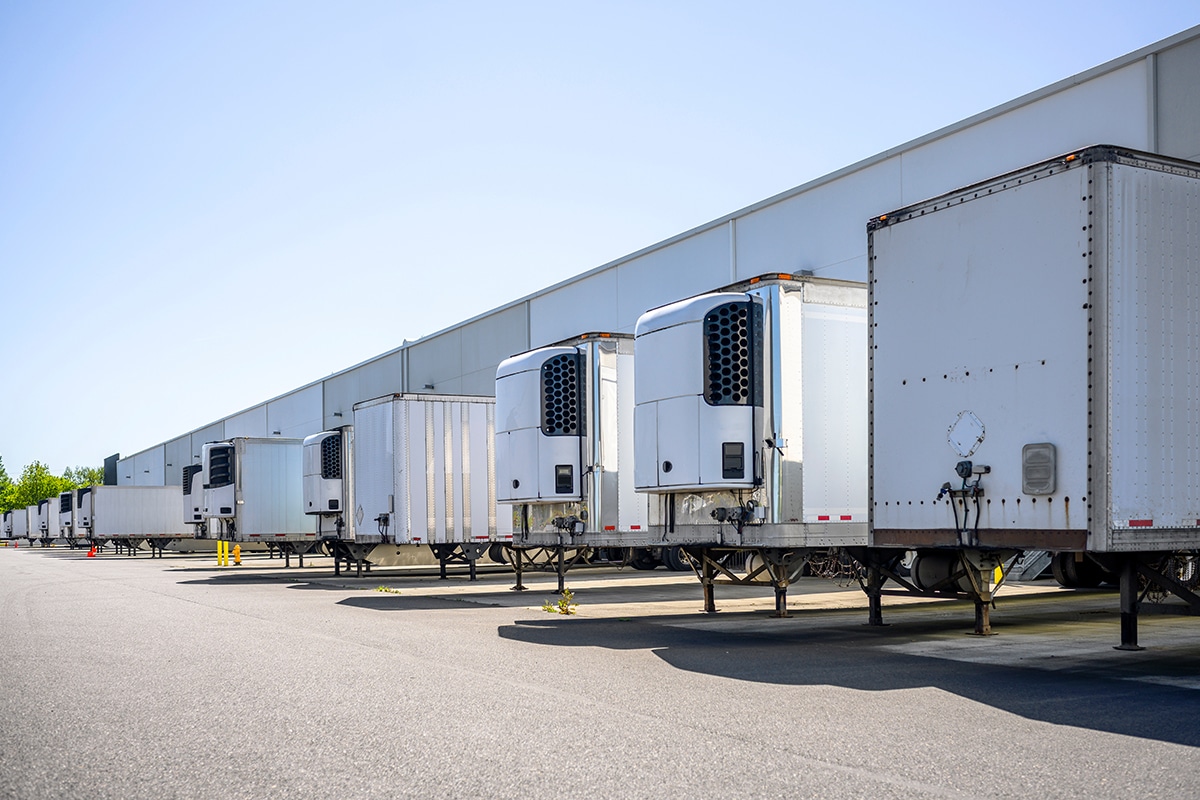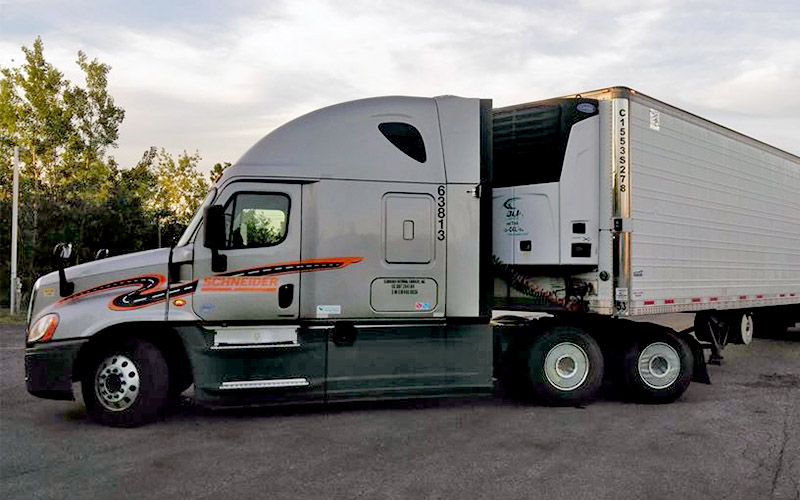Refrigerated Transportation Thermo King: The Ultimate Service
Refrigerated Transportation Thermo King: The Ultimate Service
Blog Article
Leading Innovations in Transportation Refrigeration: Enhancing Effectiveness and Safety
The landscape of transportation refrigeration is going through substantial improvement, driven by innovations intended at boosting both effectiveness and safety and security. As these innovations continue to advance, it is vital to discover their effects on functional practices and regulative compliance, triggering a better evaluation of exactly how they improve the future of transportation refrigeration.
Smart Temperature Checking Systems
In the realm of transport refrigeration, wise temperature surveillance systems have become an essential innovation for making sure the stability of temperature-sensitive items. These advanced systems take advantage of Web of Things (IoT) innovation to supply real-time data on temperature level changes, enabling drivers to maintain ideal conditions throughout the supply chain. By continually tracking the temperature level of refrigerated containers and vehicles, companies can promptly determine discrepancies that might jeopardize product high quality.

Moreover, smart tracking systems usually include automated alerts and alerts, allowing stakeholders to react without delay to any prospective issues. This positive strategy not only reduces the danger of spoilage yet also enhances compliance with governing criteria governing food safety and pharmaceutical transport.
The combination of data analytics within these systems also helps with predictive maintenance, assisting drivers to foresee potential devices failings prior to they occur. This capability decreases downtime and enhances functional effectiveness, inevitably leading to cost savings.
Eco-Friendly Refrigerants
Smart temperature level tracking systems play a vital function in maintaining item quality, yet the effectiveness of transportation refrigeration also rests on the option of refrigerants used. As environmental concerns increase, the change towards green cooling agents has come to be vital. Traditional refrigerants, such as hydrofluorocarbons (HFCs), are infamous for their high Worldwide Warming Potential (GWP), adding considerably to environment change. On the other hand, arising alternatives like hydrocarbon-based cooling agents and hydrofluoroolefins (HFOs) existing lower GWP alternatives, offering both performance and sustainability.
These green cooling agents not only reduce ecological influence yet additionally align with international policies targeted at eliminating dangerous compounds. Their adoption can result in boosted power performance, inevitably reducing operating costs for transportation refrigeration systems. In addition, making use of natural refrigerants, such as ammonia and co2, has actually obtained grip due to their excellent thermodynamic buildings and reduced environmental footprint.
Purchasing environment-friendly refrigerants is not simply a regulatory conformity measure; it represents a critical choice that enhances brand name track record and promotes customer commitment. reefer trucks thermo king. By prioritizing sustainable techniques, firms can contribute to a greener future while guaranteeing the stability of moved products
Advanced Insulation Products
Using advanced insulation materials is vital for optimizing transport refrigeration systems, as they significantly boost energy performance and maintain regular temperature control. Standard insulation methods frequently fall short in protecting against thermal transfer, resulting in raised energy usage and fluctuating temperatures within chilled compartments.
Emerging products such as vacuum cleaner insulated panels (VIPs) and aerogels provide superior thermal resistance, permitting thinner accounts without endangering performance. VIPs, for example, use a vacuum cleaner layer to minimize convective and conductive warmth transfer, making them thermo king truck refrigeration units perfect for space-constrained applications. Aerogels, understood for their light-weight and permeable structure, supply outstanding insulation while substantially reducing general system weight.
Furthermore, integrating stage adjustment products (PCMs) right into insulation systems can better stabilize temperatures during transit. These materials absorb and launch thermal energy, successfully buffering versus outside temperature level variants.
The combination of these sophisticated insulation materials not only decreases the operational costs related to energy consumption however likewise prolongs the shelf life of temperature-sensitive goods. As the transport refrigeration industry remains to advance, the fostering of cutting-edge insulation technologies will certainly be crucial in boosting both performance and security in refrigerated transport.
Automated Path Optimization
The performance of transportation refrigeration systems is significantly boosted through automated route optimization, which leverages innovative formulas and real-time data to establish one of the most effective paths for distribution. By analyzing various aspects such as traffic patterns, weather problems, and shipment windows, these systems can dramatically lower traveling time and fuel intake.
Automated path optimization minimizes human mistake and subjective decision-making, which can lead to inadequacies. This innovation enables fleet supervisors to assign resources better, making certain that cooled goods preserve their required temperature level throughout the journey. By maximizing paths, companies can likewise boost client satisfaction via prompt shipments.
Moreover, automated systems can adapt to unpredicted scenarios, such as roadway closures or unexpected website traffic spikes, enabling for vibrant rerouting. This flexibility not just protects the honesty of temperature-sensitive items but additionally contributes to overall functional effectiveness.
Applying automated route optimization can result in substantial cost financial savings while lowering the carbon footprint related to transport. As businesses progressively focus on sustainability, this development attracts attention as an important part in modern transportation refrigeration, lining up operational objectives with ecological duty. Inevitably, automated route optimization represents a substantial advancement in the quest for effectiveness and security in transportation refrigeration.

Real-Time Data Analytics
Automated course optimization substantially take advantage of the assimilation of real-time data analytics, which offers critical understandings into the efficiency of transport refrigeration systems. By using real-time data, transportation operators can monitor temperature level fluctuations and tools performance, making certain that disposable goods are kept within needed criteria throughout transit. This aggressive method not just improves the quality of the moved products yet likewise minimizes the risk of perishing and loss.

In addition to boosting effectiveness, real-time analytics improves security by making sure compliance with regulatory criteria for temperature level control. This not only protects public health however also fortifies a business's credibility - reefer trucks thermo king. As the transport refrigeration industry develops, the integration of real-time information analytics arises as a keystone for driving innovation, sustainability, and functional quality
Final Thought
In final thought, the innovations in transport refrigeration significantly enhance both effectiveness and safety and security within the sector. Jointly, these innovations stand for a crucial development in transport refrigeration, guaranteeing compliance with regulative requirements and promoting a greener future.
The landscape of transport refrigeration is undergoing significant transformation, driven by innovations aimed at improving both performance and safety and security.Smart temperature level tracking systems play an important function in preserving product quality, but the performance of transportation refrigeration likewise hinges on the choice of cooling agents made use of. Their fostering can lead to improved energy efficiency, inevitably lowering operating expenses for transport refrigeration systems. Ultimately, automated course optimization stands for a considerable advancement in the mission for performance and security in transport refrigeration.
In conclusion, the advancements in transportation refrigeration considerably enhance both performance and security within the market.
Report this page